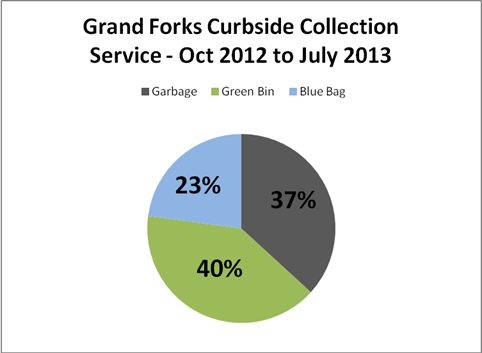RDKB diverts 20 tonnes of organic matter from the landfill each month
The Regional District of Kootenay Boundary (RDKB) started their curbside green bin collection program a year ago. During that time they have diverted 20 tonnes of organic material per month from the Grand Forks landfill, says Tim Dueck, RDKB solid waste program coordinator.
As part of the new collection program, the RDKB started picking up green bin (organic matter) on a weekly basis. Recycling and the remaining household garbage are collectted on alternating weeks. Dueck said that some people have been able to reduce their garbage to either one can a month or they have completely eliminated the need for garbage pick-up.
Once household waste is collected, it is taken to the landfill and divided into different “streams.” The recycling goes into the recycling bins, the garbage is buried at the landfill and the green bin organics are put in the composting section. At the Grand Forks landfill, this is to the left of the entrance.
The green bin material is mixed with yard waste like tree clippings to create a balanced composting material that can be used to cover old landfill sites.
The RDKB closed three landfill sites in the Boundary this spring – one at Christina Lake, one at Rock Creek and a third in Beaverdell.
Closed landfills are covered with clay and then organic material, which Dueck says help eat the escaping methane from the buried garbage as it decomposes.
The landfills will need to be topped with compost for at least three years and then the RDKB will look for other ways to use organic material.
Green bin concerns
Some concerned residents feel the green bins are an attractant for local wildlife, especially after seeing an increase in bear activity in Grand Forks this fall.
Dueck said it’s unlikely the green bins are more of an attractant.
“There is nothing new about the material in the can,” he said. “The green bins are not any more of an attractant than the garbage was before.”
He has also said there have been no more than 10 reports of bear interaction with the bins in the last year.
“I have asked my drivers to report if they see any signs of bears in the bins,” he said, adding 10 reports is probably an exaggeration.
The main problem with bears in the bins continues to be a storage issue.
“The bins needs need to be stored securely in a closed building like a storage shed or garage,” said Dueck, adding that is true whether it’s the garbage, recycling or green bins.
Illegal dumping
Since the changes to landfills and transfer stations in the spring, some residents have raised concerns about illegal dumping.
“Not sanctioned waste disposal is a problem all over the world,” said Dueck.
Dueck noted it’s impossible to know if the amount of illegal dumping has increased in the last year because they don’t weigh the material they find. However, he understands that people are having a hard time transitioning from free transfer stations to having to pay at the landfill.
“People may take a while to get used to the idea that they have to pay to get rid of garbage,” he said. “This (landfill fees) is the norm in BC. There are only one or two districts that have free garbage collection but it’s not really free. The taxpayers are still paying for it.”
Dealing with illegal dumping can be tricky. According to Dueck, if the material is on a right-of-way or Crown land the Report All Poachers and Polluters (RAPP) hotline should be called at 1-877-952-7277. On private land, the issue is usually between the dumper and the landowner, said Dueck. Landowners will have the option to call the RCMP to investigate.
Boundary municipalities have different bylaws on littering and illegal dumping. The bylaw enforcement officer in Grand Forks can be reached at (250) 442-8266. Midway doesn’t have a bylaw officer but municipal staff will deal with complaints at (250) 449-2222. The City of Greenwood does not have any bylaws specific to illegal dumping, but can be reached at (250) 445-6644 for any questions.


























Comments